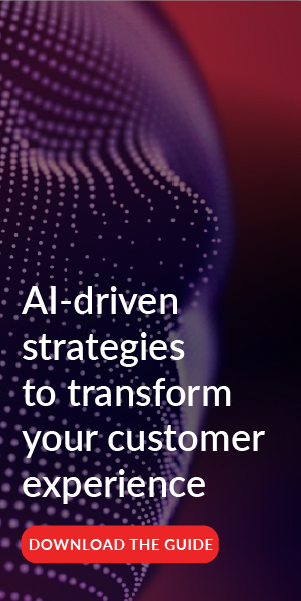Topics
How an AI Copilot Turns Contact Center Reps into Super Agents

Is there such a thing as the perfect call center agent?
Customer experience (CX) is more personalized to each user than ever. Companies constantly seek the “perfect” contact center agent—someone who can manage customer inquiries, provide accurate information, and maintain a positive attitude.
You need a human touch to provide the best possible customer service. And that isn’t changing, even as AI gets more sophisticated. Of course, this means finding the people with the right talent, training them, and giving them tools for success.
Today, you can deploy readily available technologies to augment any agent’s effectiveness, so they can face challenges and meet customers’ expectations.
An ordinary contact center agent becomes a “Super Agent” when outfitted with a modern toolkit capable of adapting to each customer’s needs.
The current state of contact centers
Historically, contact centers operated in a reactive mode, responding to customer inquiries as they arose. High call volumes often overwhelmed agents, leading to long wait times and frustrated customers.
Traditional contact centers relied heavily on scripted responses and limited access to customer data. This “one size fits all” approach made it challenging for them to resolve issues.
Companies eventually realized this approach wasn’t sustainable. And the data reflects this: a report by the UK’s Institute of Customer Service revealed that the UK Customer Satisfaction Index (UKCSI) dropped to 75.8 in July 2024, marking a decrease of 2.6 below the high point of 78.4 in July 2022 and the lowest score recorded since 2015. We’re seeing this same trend in the US and even globally.
This decline highlights contact centers' challenges in delivering satisfactory customer experiences, and it underscores the need for more innovative, future-forward solutions.
Modern contact centers combat this with advanced technologies, including AI, to create a more proactive service environment. These centers have tools that provide agents with real-time data to personalize interactions and resolve issues faster.
But this doesn’t solve everything. Other common pain points, like complex customer queries and gaps in training efficiency, still plague the modern contact center. Human imperfections affect a customer’s decision to give you their business. The AI copilot fills in those gaps.
What is an AI copilot?
An AI copilot is an advanced software tool that provides contact center agents with the information and resources they need to perform better.
Unlike traditional automation tools that many worry could replace human agents, AI copilots augment agents’ capabilities. They serve as a supportive partner in the customer service process—not as a high-tech way to eliminate the need for human agents.
AI copilots use machine learning algorithms and natural language processing to analyze customer interactions, pull relevant product information, and provide contextual insights.
For example, when a customer reaches out with an inquiry, the AI copilot can access the customer’s interaction history across multiple channels. This allows the agent to address the issue without making the customer repeat themselves.
How AI copilots enhance agent effectiveness and efficiency
AI copilots improve agents' performance by giving them real-time data access, which reduces the time spent on research and allows agents to focus on resolving issues.
They can also automate routine inquiries to save agents valuable time. Customers can start their inquiries with a chatbot that gathers information and, in many cases, solves their problems without any human intervention. This gives agents time to concentrate on more complex issues that require emotional intelligence and human interaction.
An AI copilot also summarizes customer concerns for the agent, which means the customer won’t have to repeat themselves if they must input data into self-service systems and/or speak to multiple people. Rehashing the same information can be frustrating for both customers and agents.
And this is just the beginning. Pega’s AI experts believe we’re currently only using 3–4% of the potential tools in the AI toolbox. Just imagine what an AI copilot—and the human piloting the contact center—can do for your business in the very near future.
The business impact of AI-enhanced agents
Integrating AI copilots into contact centers can lead to substantial business benefits, including:
- Improved first-call resolution rates: AI-enhanced agents are better equipped to resolve customer issues on the first call, making follow-up interactions less likely.
- Increased agent productivity: Agents can handle a higher volume of inquiries with the help of an AI copilot because of access to real-time information.
- Better customer satisfaction and loyalty: According to Forbes, investing in loyal and returning customers can yield substantial gains. The article quotes research showing that “existing customers are 50% more likely to try new products and spend 31% more, on average, compared to new customers.”
- Return on investment: Companies that embrace AI technology often see improvements in operational efficiency and customer retention, translating into higher revenue.
But one of the most interesting aspects of the business impact of co-pilot AI is the ability to manage service complexity and foster collaboration with a team that understands AI is a supporting role rather than the main character. This is positive message to convey to team members who will remain vital in supporting customer satisfaction.
Managing service complexity
Complex inquiries often involve multiple people in different departments within the call center, which requires seamless coordination. Even if first contact with the customer is positive, a disjointed, inefficient response can sour that positive experience.
Organizations need to connect resources and expertise to the people on the front lines: the contact center agents. Companies outsourcing vital business processes should partner with a team that focuses on new CX technologies and how to use them effectively. Traditional BPOs don’t work anymore. This collaborative approach does.
Also, choosing a partner that doesn’t align with your goals and mindset hinders your company’s ability to reach its full potential. It doesn’t matter how much you invest if you still don’t have the support to deliver consistently positive experiences to the customer.
Where humans fit into an AI-driven environment
It’s important to emphasize that AI is, first and foremost, a tool to improve human performance—never a replacement. AI copilots enhance agent efficiency, but they can’t handle inquiries requiring emotional intelligence.
Peter van der Putten, Director of the AI Lab at Pegasystems, suggests that many businesses will aim to create “autonomous enterprises” that optimize processes while keeping humans in control. Think of the self-driving car: it’s designed to get you to your destination safely, but it needs human oversight to ensure that happens. The new AI-driven contact center is similar, with human agents ready to intervene and guide interactions as needed.
Get where you need to go with an AI copilot
AI copilots empower CX agents with valuable resources, which will revolutionize contact centers. Combining AI and human interaction can improve customer experience and business outcomes.
Advancements in technology should solve problems, not create new ones. Leverage AI into solutions that enhance the customer experience. That’s where the future is heading—and future-facing partners that understand AI’s potential can help you get there.
Download "How AI should enhance your customer experience in 2025: A guide to finding the right BPO innovation partner" to learn more about how these innovations are enhancing the customer experience.


